Updated 11 months ago
Expert review of CertainTeed solar panels and solar shingles
Written by
Catherine Lane
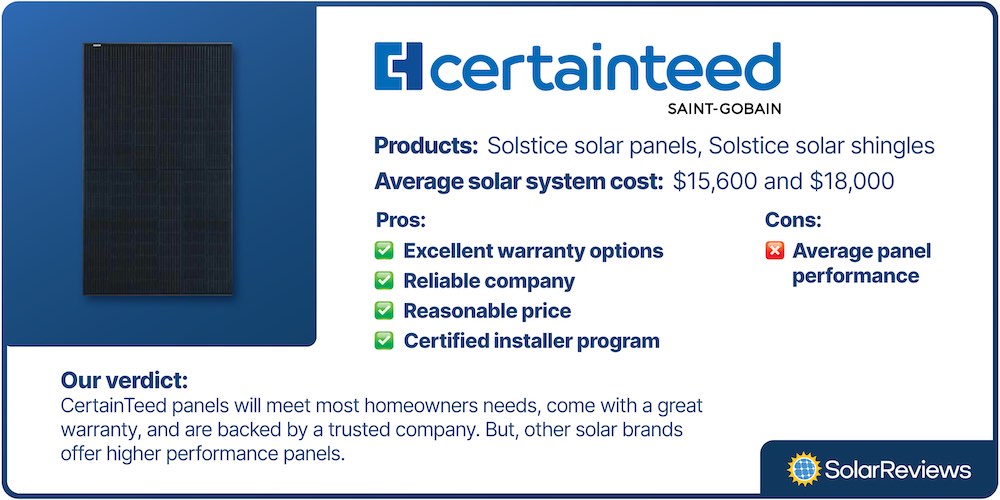
CertainTeed, a subsidiary of Saint-Gobain, has been in business for over 100 years. Since its founding in 1904, the company has expanded into one of the largest building material manufacturers, producing shingles, siding, and even solar products.
The newest iteration of CertainTeed’s solar line, Solstice, includes solar panels and shingles. CertainTeed’s solar panels are average performers but come at a low price with top-of-the-line warranty options.
Pros and cons of CertainTeed solar panels
Pros | Cons |
|---|---|
Excellent warranty options | Average panel performance compared to competitors |
Reliable company |
|
All-black design |
|
Certified installer program makes it easier to find trusted solar companies |
|
Reasonable price |
|
CertainTeed Solstice panels are a good option for most homeowners looking to go solar. With reasonable pricing, a sleek design, and excellent warranty options from a trusted company, you can’t go wrong with putting CertainTeed panels on your roof. The company also has a network of pre-screened installers that can give you access to additional warranty coverage.
The biggest downside to CertainTeed panels is that their performance could be better. There’s no stand-out specification for the Solstice models, so for those wanting the latest and greatest, CertainTeed might not be what you’re looking for.
What solar panels does CertainTeed offer?
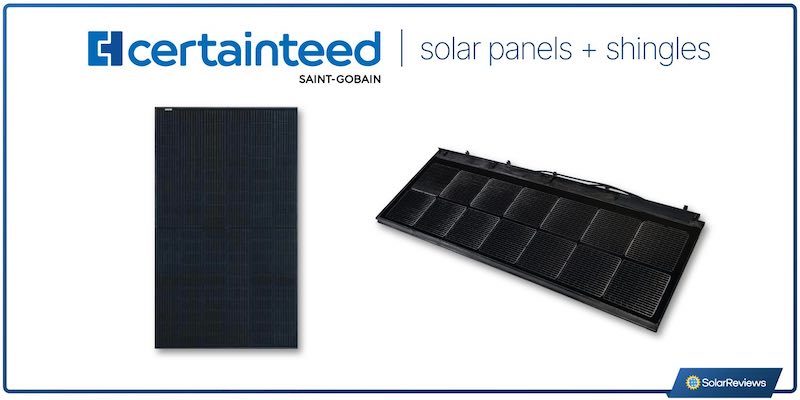
CertainTeed has two solar products: the Solstice solar panels and solar shingles.
Solstice solar panels
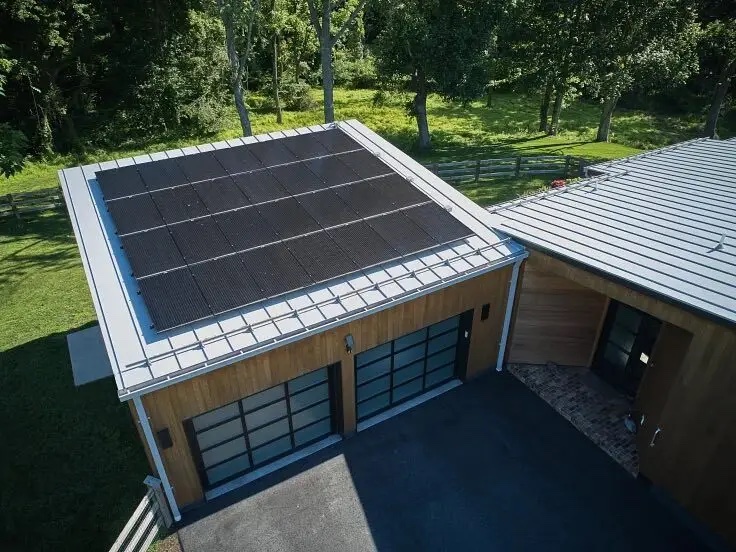
Image source: CertainTeed
CertainTeed’s solar panels can be installed on your roof to generate electricity for your home, reducing your carbon footprint and electricity bill.
The Solstice panels are all-black, which means they look uniform on your roof, especially compared to solar panels from other brands that may have white space. CertainTeed’s panels utilize half-cut monocrystalline solar cell technology. Simply put, CertainTeed uses high-performing and durable materials in its solar panels.
There are two Solstice models: a 400-watt (W) and 440 W. The 440 W model is slightly bigger, so it might not be the right choice for those with limited roof space. Both CertainTeed solar panel models have solid performance metrics and come backed by the company’s 25-year performance warranty.
Solstice solar shingles
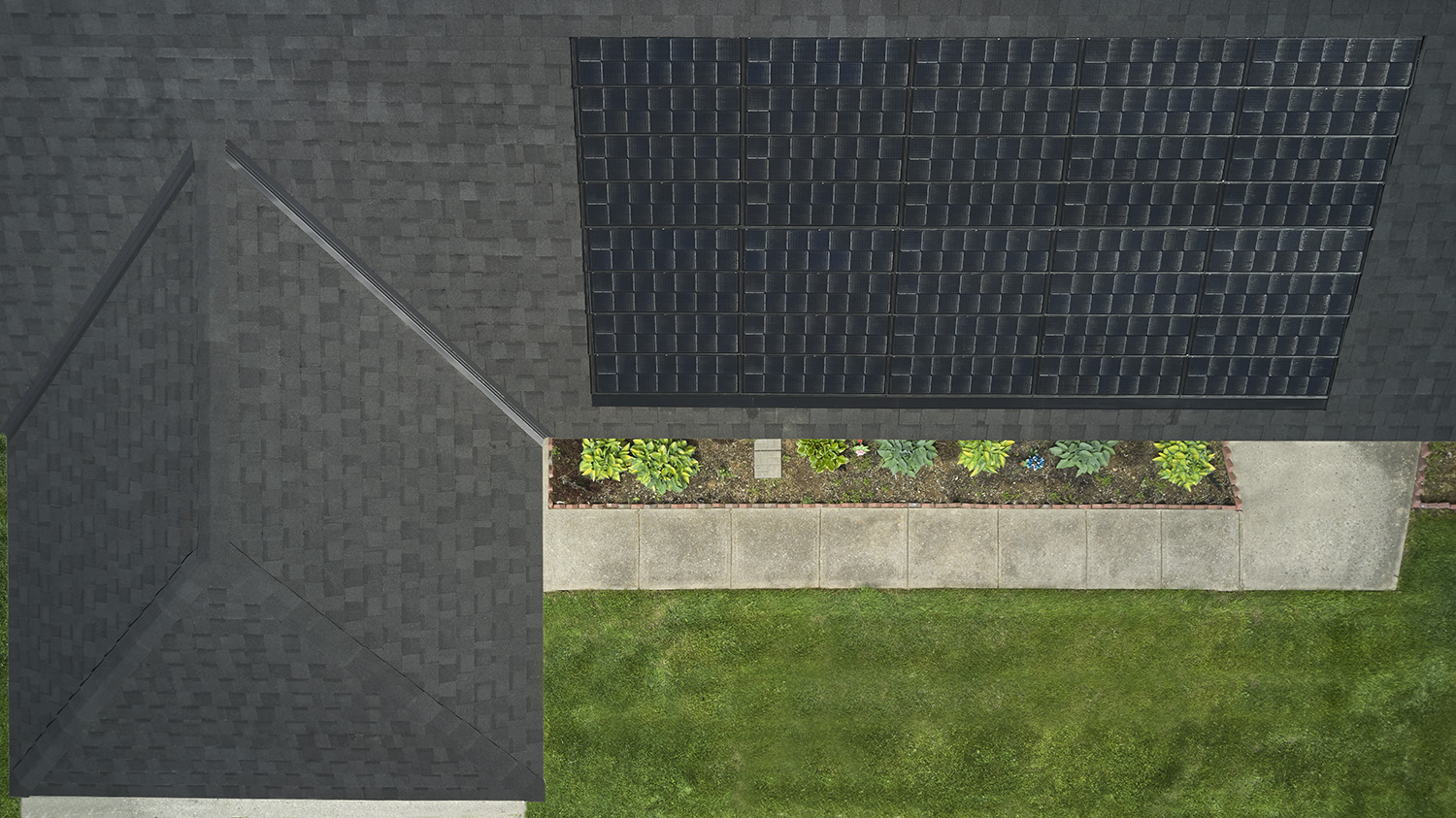
Image courtesy of CertainTeed/Photo by Mark Belaer Studio 66
It comes as no surprise that a roofing industry giant like CertainTeed would sell a solar shingle. Solar shingles are meant to blend in with an existing roof, so homeowners can go solar without sacrificing the curb appeal of their home.
CertainTeed’s solar shingles are all black and can be installed by roofers. Each Solstice shingle can output 70 W of power and is designed to look like traditional asphalt shingles, making them less noticeable when installed.
Traditional roofing crews can install Solstice solar shingles, which are built to generate electricity and protect your roof.
CertainTeed solar panels vs. other solar brands
| Power output | Efficiency | Temperature coefficient |
|---|---|---|---|
Industry average | 400 - 430 W | 20% - 21.8% | -0.30% |
CertainTeed Solstice | 400 - 440 W | 20.4% - 20.5% | -0.35% |
CertainTeed’s Solstice solar panels fall right in line with industry standards. If you want something with outstanding performance specifications, CertainTeed might not be what you’re looking for. But, for most homeowners, CertainTeed’s solar panels are an excellent solution for powering your home with solar energy.
Power output
The power output of a solar panel measures how much power the panel can release under ideal conditions, measured in watts. Today, most residential solar panels have a power output between 400 and 430 W. CertainTeed’s two solar models fall right and are right in this range at 400 W and 440 W.
Efficiency
Solar panels are more efficient today than in the past, with the average panel being between 20% and 21.8% efficient.
At 20.5% efficiency, CertainTeed’s panels are pretty average. You can find panels from other brands that are more efficient, but unless you have very limited roof space, the efficiency rating shouldn’t be a make-or-break decision when choosing panels.
Temperature coefficient
All solar panel specifications are measured at a set of laboratory conditions called Standard Test Conditions. Unfortunately, your roof isn’t a lab, so how the panels will perform once installed won’t live up to the numbers on the datasheet.
The temperature coefficient measures how much power output decreases as surface temperature increases, giving some insight into how solar panel performance changes in real-world conditions.
Most solar panels have a temperature coefficient of about -0.3%. CertainTeed’s panels come in at -0.35%, just slightly above average, meaning they don’t operate as well as others under high temperatures. But, the differences are minimal. Because CertainTeed’s panels are still in the general ballpark of the industry average, we feel confident they’ll be strong performers when on your roof.
Are CertainTeed’s solar shingles good performers? CertainTeed’s solar shingles have an output of 70 W, just about the same as the Tesla Solar Roof and almost double the output of GAF’s solar roofing shingles. CertainTeed is also the only one of these three companies to reveal the efficiency of their solar shingles - 19.85%. That’s pretty impressive for a solar roofing product!
Does CertainTeed offer a good solar warranty?
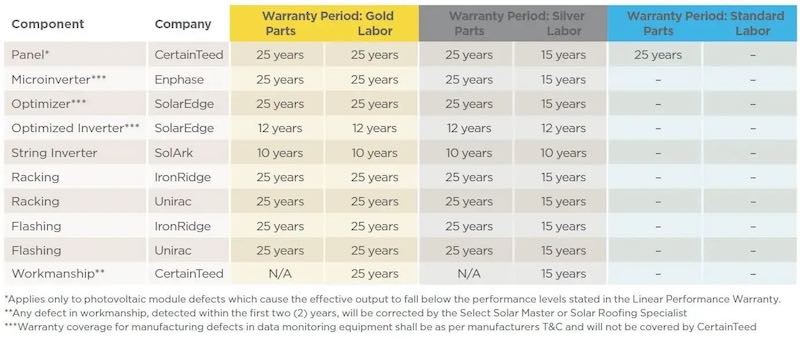
CertainTeed’s warranty terms. Image source: CertainTeed
Solar panel warranties are important when shopping for a solar system, and it’s where CertainTeed shines.
CertainTeed’s performance warranty is in line with industry standards, guaranteeing the panels will output at least 85% of their initial rated capacity by the end of 25 years. Solstice panels also have a 25-year product warranty that ensures the panels will be free from manufacturing defects. Many manufacturers only offer a 12-year product warranty.
Homeowners who go solar with CertainTeed-certified contractors can get additional coverage through the Silver and Gold warranties, which cover the panels, inverters, optimizers, racking, and flashing, so long as they're from qualified brands. The Gold warranty is available for customers of CertainTeed Select Solar Master Installers, while the Silver is for CertainTeed Solar Master Installers.
The Gold and Silver warranties also guarantee the system will be free of workmanship damage over the warranty term (25 years for Gold, 15 years for Silver). If CertainTeed finds the workmanship warranty covers a claim, it will be fixed at no cost to the customer.
Having your equipment covered by one warranty makes it easier to file warranty claims in the future. CertainTeed guarantees coverage under the Gold and Silver warranties, even if your original solar installer goes out of business.
Read More: CertainTeed’s solar warranty coverage
CertainTeed is a company you can trust. A solar warranty is only useful if the company is around in the future to honor it. Luckily, this isn’t an issue when you get Solstice panels or solar shingles. CertainTeed is a reliable company that has been around for over 100 years. You can trust that if anything goes wrong, CertainTeed will be around to cover it.
How much do CertainTeed solar panels cost?
An average-sized CertainTeed solar panel system costs between $15,600 and $18,000 to install, which works out to between $2.60 and $3.00 per watt of solar. When you consider the 30% federal solar tax credit, the price can drop as low as $11,000!
This falls right in line with the average cost of solar in the United States. Remember, the actual price you pay will vary depending on where you live, the size of your system, and the installer you choose.
How much do CertainTeed solar shingles cost?
There is very little information available about the price of the Solstice shingles. But, because solar shingles are a newer product, you can expect an installation to be higher than conventional solar panels.
But, the Solstice shingle price will probably be lower than its biggest competitor, the Tesla Solar Roof, mostly because Tesla’s solar shingle option requires a complete roof replacement with expensive roofing materials. With CertainTeed, you might not have to reroof your home completely; if you do, the cost of roofing materials will probably be cheaper than Tesla’s offering.
Find the right installer for the best CertainTeed solar system
Choosing the right solar installer is the most important part of going solar. You want a company you trust on your roof that can support you for the full 25-year lifespan of your solar panels!
Our team of home solar experts recommend solar installation companies that:
Have been in business for at least five years,
Have positive customer reviews,
Carry good quality products, like CertainTeed panels, and
Employ certified installation crews.
CertainTeed’s Solar Master installer program makes it easy to find solar companies that need to meet minimum standards. But you shouldn’t stop there! Get quotes from multiple solar companies so you can get the best service and the best price possible!
Catherine is a solar industry analyst and content manager with five years of experience researching and reporting on residential solar. As the former Written Content Manager at SolarReviews, she led a team producing informative content to help homeowners make informed decisions about solar investments. Her expertise has been featured in Solar Today Magazine and Solar Industry Magazine, with insights cited by major outlets including Forbes and Bl...
Learn more about Catherine Lane